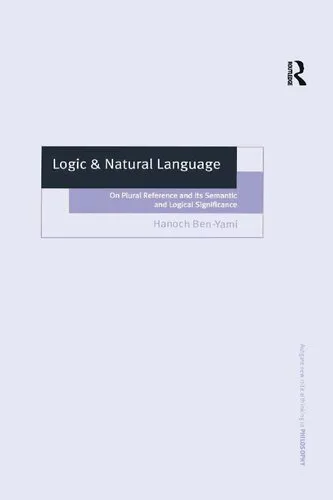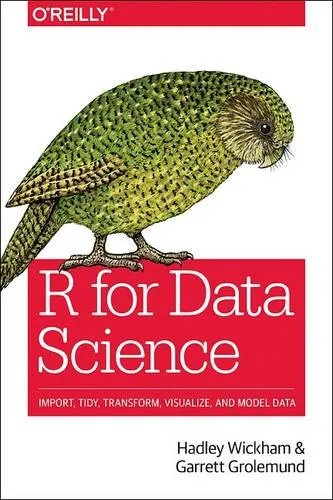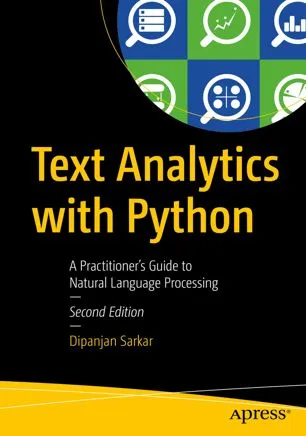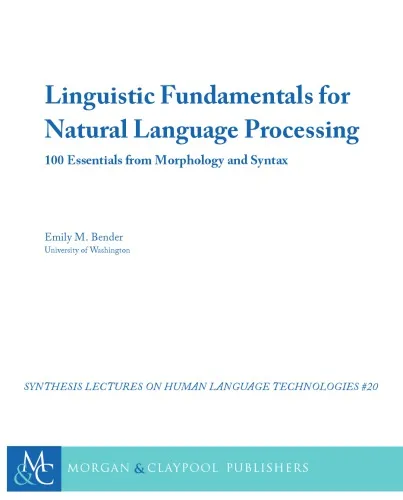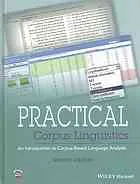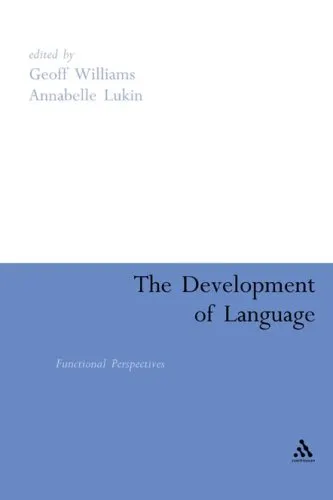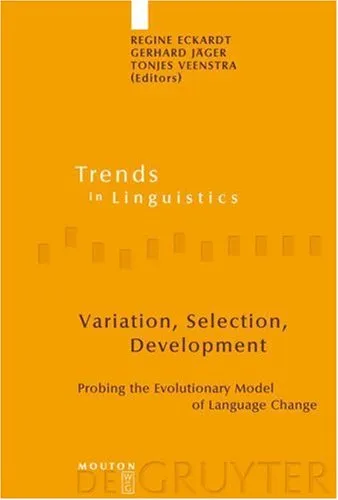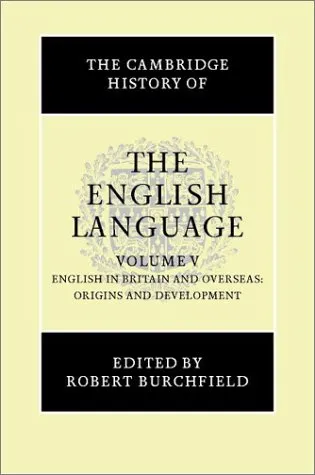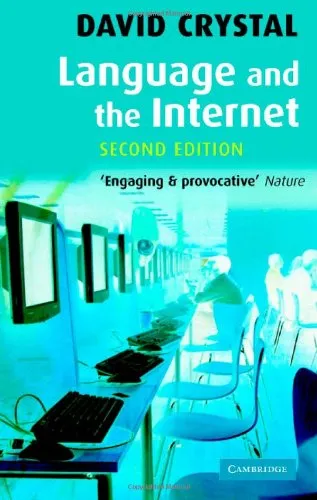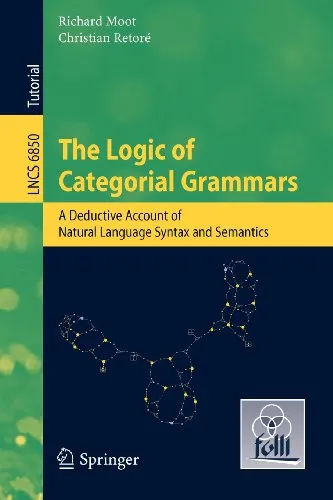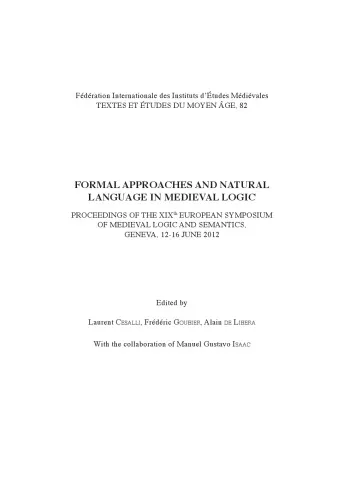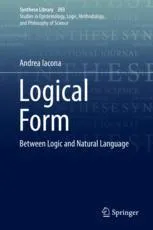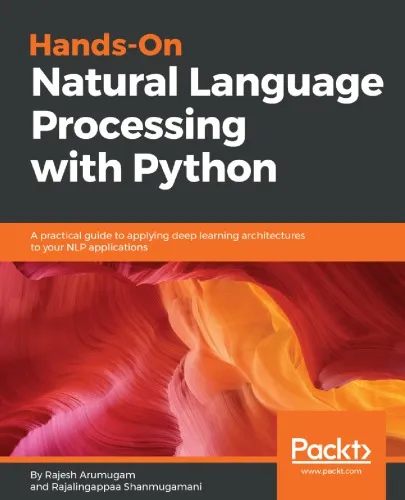Logic & Natural Language: On Plural Reference and Its Semantic and Logical Significance
4.0
بر اساس نظر کاربران

شما میتونید سوالاتتون در باره کتاب رو از هوش مصنوعیش بعد از ورود بپرسید
هر دانلود یا پرسش از هوش مصنوعی 2 امتیاز لازم دارد، برای بدست آوردن امتیاز رایگان، به صفحه ی راهنمای امتیازات سر بزنید و یک سری کار ارزشمند انجام بدینکتاب های مرتبط:
معرفی کتاب "Logic & Natural Language: On Plural Reference and Its Semantic and Logical Significance"
کتاب "Logic & Natural Language: On Plural Reference and Its Semantic and Logical Significance" از هانوخ بنیامی اثری است که به بررسی عمیق و چندوجهی مفاهیم مرجعیت جمعی (Plural Reference) در زبان طبیعی میپردازد. این کتاب تلاش میکند تا تقاطع میان منطق، زبانشناسی و فلسفه را آشکار کرده و تأثیرات آن بر درک و تحلیل ما از زبان و استدلال را مورد بررسی دقیق قرار دهد.
خلاصهای از کتاب
این کتاب به بررسی یکی از موضوعات پیچیده و گسترده در فلسفه زبان و منطق میپردازد: مرجعیت جمعی. مرجعیت جمعی به این معناست که در زبان طبیعی، ما اغلب واحدهای زبانی را به گروهها و مجموعهها اشاره میدهیم، و این اشارات اغلب چالشهای جدی در تحلیل معنایی و منطقی ایجاد میکنند. نویسنده در این کتاب این پرسش اساسی را مطرح میکند که چگونه مفاهیم زبانی و منطقی را میتوان برای تحلیل چنین ساختارهای زبانی به کار گرفت. او تلاش میکند که با استفاده از ابزارهای منطق و زبانشناختی، معنا و دلالت عبارات جمعی را روشن کند و به تأثیرات فلسفی و منطقی آن بپردازد.
کتاب در فصول مختلف به مباحثی نظیر روابط منطقی مرجعیت جمعی، ساختارهای زبانی که معانی جمعی را نشان میدهند، و تفاوتهای اساسی میان زبان طبیعی و زبان صوری در تحلیل منطق معنایی میپردازد. هانوخ بنیامی تلاش میکند تا از طریق مثالها و استدلالهای متقن نشان دهد که چگونه زبان طبیعی، با تمام پویاییها و پیچیدگیهایش، میتواند به نحوی تجزیه و تحلیل شود که مرزهای منطق سنتی را به چالش بکشد.
نکات کلیدی
- تبیین مفهوم Plural Reference و جایگاه آن در مطالعات فلسفی و منطقی.
- تحلیل مفصل تفاوتهای زبان طبیعی و زبان صوری در تحلیل معنایی.
- تمرکز بر اهمیت مرجعیت جمعی در منطق و کاربردهای آن در سایر حوزهها.
- ارائه چارچوبی برای درک تکامل منطق در پاسخ به مسائل زبانشناسی.
- تحتالشعاع قرار دادن تحلیل معنایی براساس استفاده روزمره از زبان.
نقلقولهای معروف از کتاب
"The boundaries of language are not constraints; they are open possibilities for understanding collective reference in a way that traditional logic often neglects."
"In the interplay between words and meaning, lies an intricate dance of logic where plural significances demand new perspectives."
چرا این کتاب مهم است؟
کتاب "Logic & Natural Language" از این جهت اهمیت دارد که به یکی از مسائل اساسی و بنیادین در فلسفه زبان و منطق پرداخته و راهحلهایی نوآورانه و خلاقانه برای آن ارائه داده است. در دنیای رو به گسترش هوش مصنوعی و پردازش زبان طبیعی، فهم درست از مرجعیت جمعی و معانی جمعی ضروریتر از همیشه است. این کتاب نهتنها به فهم عمیقتری از زبان طبیعی کمک میکند، بلکه چارچوبهایی برای تحلیل و مدلسازی آن در زمینههای مختلف ارائه میدهد. همچنین خواندن این کتاب برای کسانی که به دنبال تقویت دانش خود در حوزه فلسفه زبان و منطق هستند، توصیه میشود.
Introduction to "Logic & Natural Language: On Plural Reference and Its Semantic and Logical Significance"
"Logic & Natural Language: On Plural Reference and Its Semantic and Logical Significance" is a profound exploration of the connections between logical theory, semantics, and the nature of language. Written with meticulous philosophical rigor, this book addresses fundamental questions about how plural reference impacts our understanding of both language and logic. My aim in writing this work was not only to advance the theoretical understanding of plural reference but also to provide insights that could illuminate broader debates in linguistics, philosophy, and logic.
In this book, I explore the challenges that plural terms and plural reference pose to traditional logical systems, assess how these challenges can be met, and propose frameworks to effectively incorporate plurals without sacrificing logical coherence. The book investigates the semantic implications of plural expressions as they occur in natural language and examines their effect on prevailing logical theories. This is not merely an abstract theoretical discussion; rather, it is a venture into understanding how natural languages operate and how we can align logical systems with them when they are expanded to include plural and collective references.
Let us delve deeper into the significance of these ideas and what this book has to offer to its readers.
Detailed Summary of the Book
The book begins with an introduction to the concept of plural reference, explaining how it arises in natural language and why it presents challenges for classical logical systems. Plural terms, unlike singular terms, allow speakers to talk about multiple entities collectively. However, employing such terms in logical frameworks raises questions about reference, meaning, and truth conditions.
The central thesis of the book argues that existing approaches to logic, such as predicate logic and its formalization, must be extended or revised to handle plural expressions appropriately. I examine common logical frameworks, including first-order logic, and assess their limitations when encountering plurals like "they," "these," or "several." The book develops possible solutions to formalize plural reference while minimizing the disruption to classical logical structures.
As the discussion unfolds, I explore the differentiation between distributive and collective readings of plural expressions. For example, the sentence "The students lifted the piano" can refer to each student individually trying to lift the piano (distributive interpretation) or the students collectively working together (collective interpretation). This distinction has profound implications for semantics and poses distinctive challenges for logical treatment.
The latter part of the book proposes new conceptual models that integrate plural reference into logical systems and provides detailed philosophical discussions of their consequences. These models aim to reconcile natural language’s fluidity with the precision of logical formalism, ensuring that logic remains a faithful analytical tool for real-world linguistic usage.
Key Takeaways
- Plural reference in natural language challenges classical logical systems, requiring careful philosophical and logical examination.
- The book emphasizes the need to distinguish between distributive and collective interpretations when analyzing plural expressions.
- Extending logical frameworks to account for plurals can enhance our understanding of language, meaning, and truth conditions.
- This book bridges the gap between abstract logical theory and the practical use of language, offering a rich perspective for both philosophers and linguists.
Famous Quotes from the Book
"The plural is not merely a multiplicity of the singular; it is an expression of collective and distributive cognitive realities."
"To understand language is to understand the ways in which it fragments and unifies the world, even when dealing with the many."
"Logical formalism must not resist the richness of natural language; it must adapt and grow to encapsulate its plurality."
Why This Book Matters
"Logic & Natural Language: On Plural Reference and Its Semantic and Logical Significance" fills an essential gap in the intersection of philosophy, linguistics, and logic. Despite the ubiquity of plural expressions in everyday language, traditional logical systems do not adequately address their semantic complexity or the philosophical questions they evoke. This book provides the theoretical tools to bridge this divide, making it an invaluable resource for anyone interested in understanding or advancing logic and meaning.
The implications of this study extend beyond academic theory; they touch on how we conceptualize and communicate about the world. By formalizing and analyzing plural reference, the book equips us with better tools to approach problems in logic, artificial intelligence, computational linguistics, and philosophy of language.
Whether you are a student of philosophy, a linguist, or a seasoned logician, this book offers a unique perspective on the fundamental nature of language and thought. Its challenges and proposals aim to inspire further inquiry and collaborative advancement in the field. By integrating perspectives on natural language into logical discourse, this book demonstrates why logic must continuously evolve to remain vital and relevant.
دانلود رایگان مستقیم
شما میتونید سوالاتتون در باره کتاب رو از هوش مصنوعیش بعد از ورود بپرسید
دسترسی به کتابها از طریق پلتفرمهای قانونی و کتابخانههای عمومی نه تنها از حقوق نویسندگان و ناشران حمایت میکند، بلکه به پایداری فرهنگ کتابخوانی نیز کمک میرساند. پیش از دانلود، لحظهای به بررسی این گزینهها فکر کنید.
این کتاب رو در پلتفرم های دیگه ببینید
WorldCat به شما کمک میکنه تا کتاب ها رو در کتابخانه های سراسر دنیا پیدا کنید
امتیازها، نظرات تخصصی و صحبت ها درباره کتاب را در Goodreads ببینید
کتابهای کمیاب یا دست دوم را در AbeBooks پیدا کنید و بخرید
1463
بازدید4.0
امتیاز0
نظر98%
رضایتنظرات:
4.0
بر اساس 0 نظر کاربران
Questions & Answers
Ask questions about this book or help others by answering
No questions yet. Be the first to ask!
